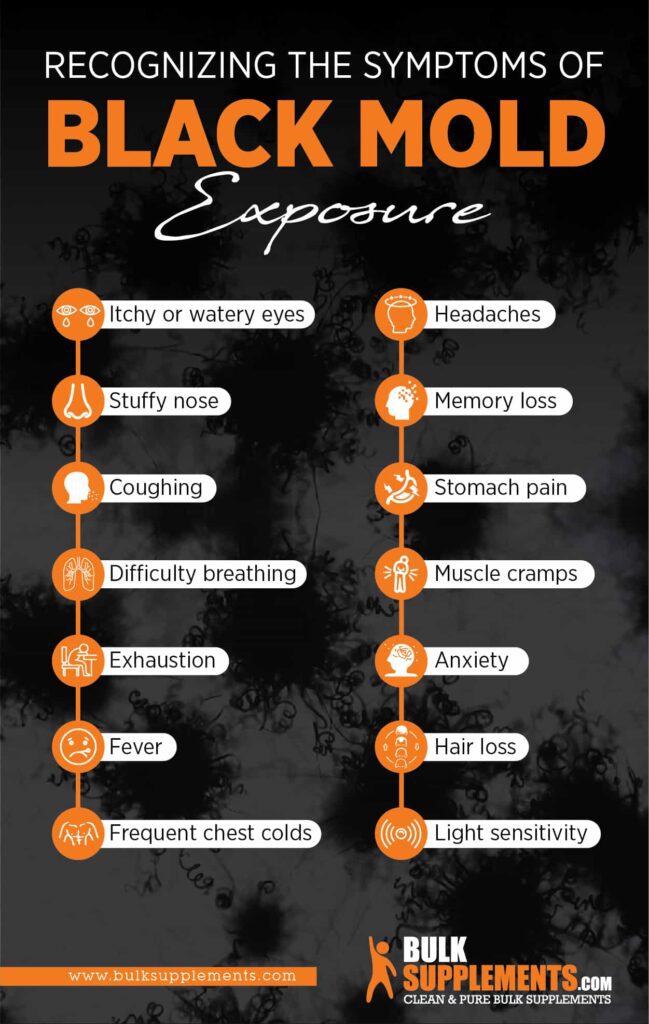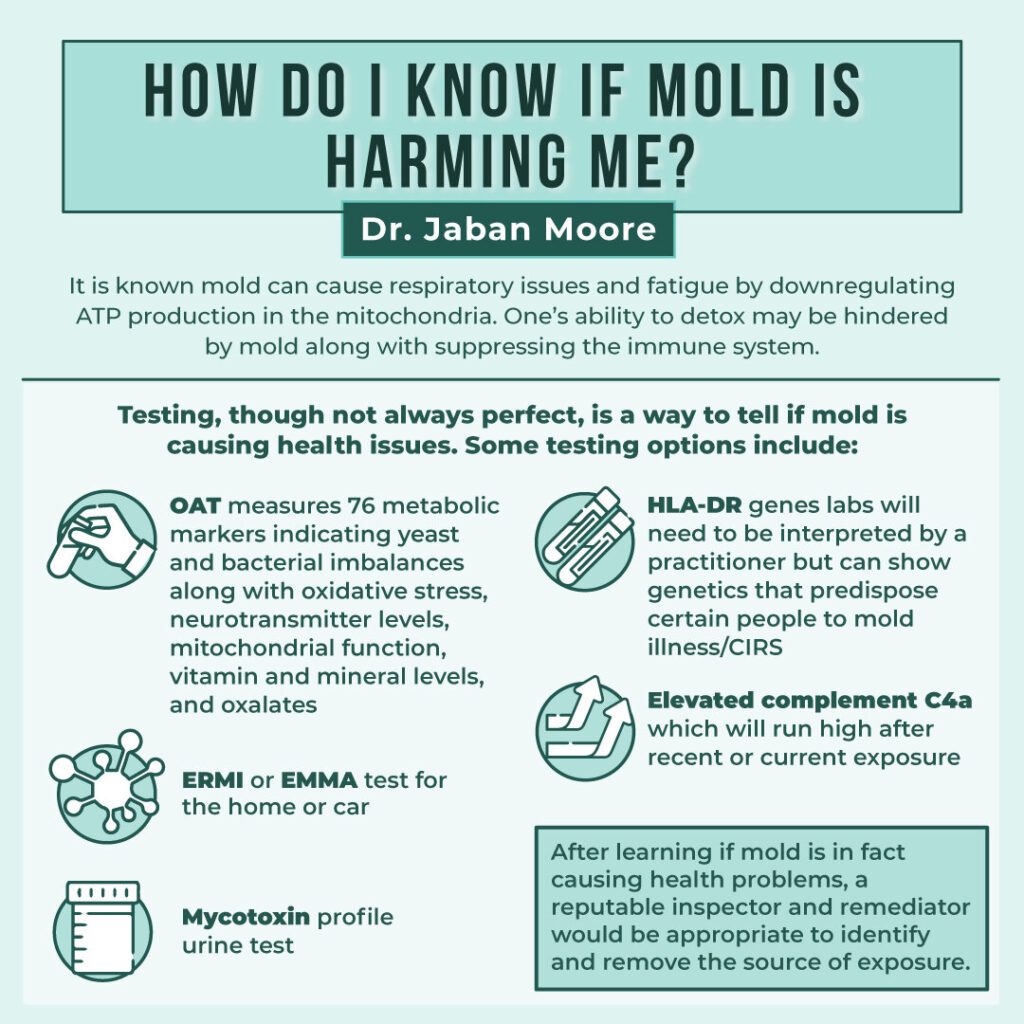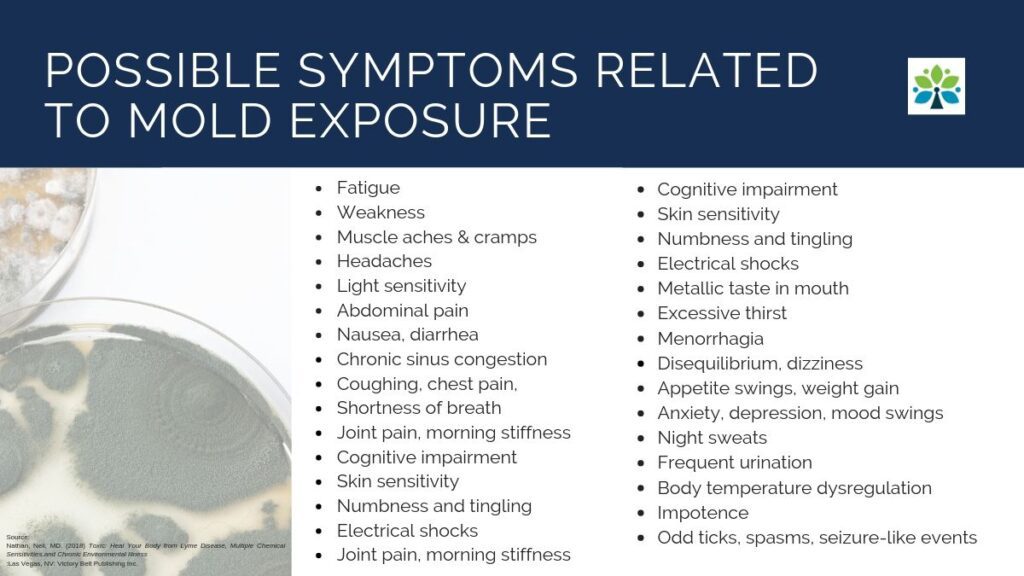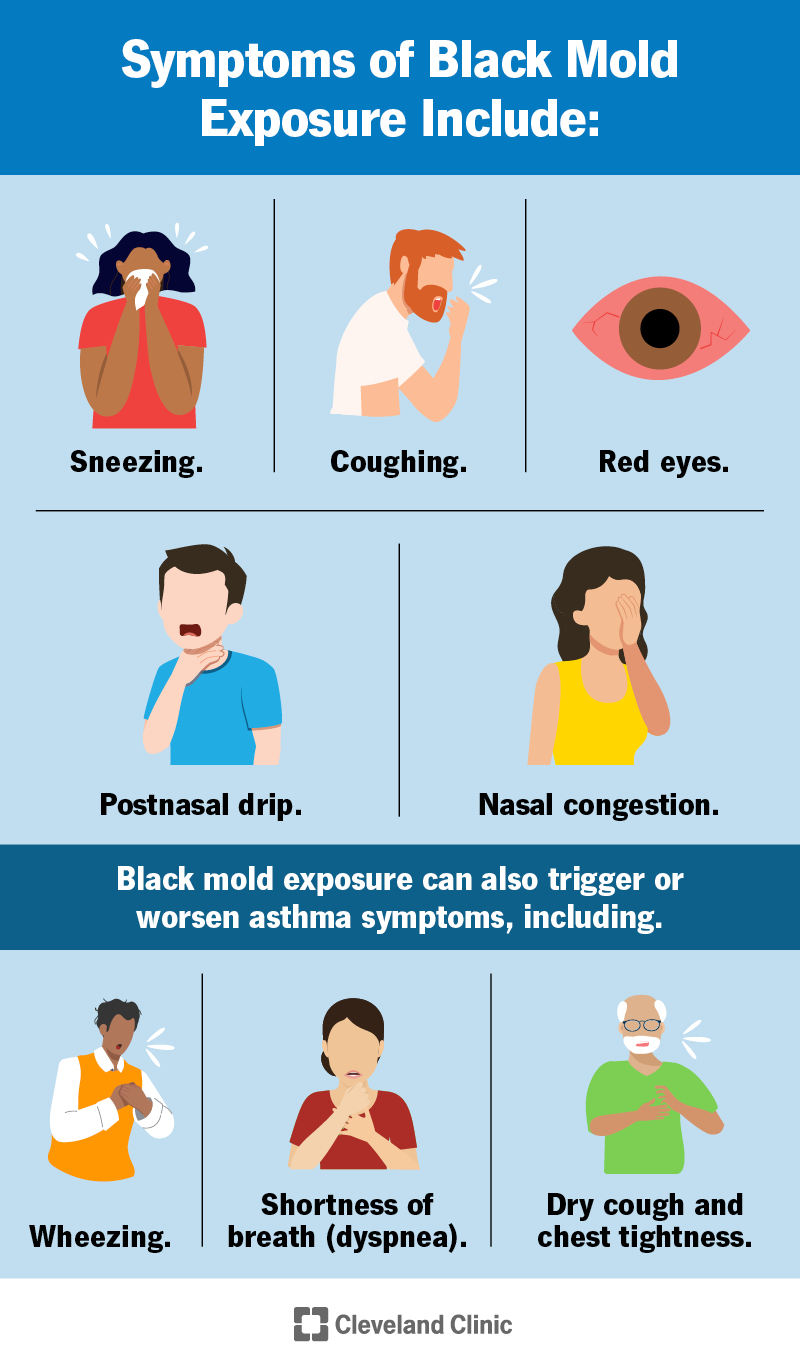In this article, you will learn about the symptoms that can occur from prolonged exposure to black mold and how to recognize potential chronic health issues. Black mold is a type of fungus that can grow in damp and poorly ventilated areas. While it may not always cause immediate health problems, prolonged exposure to black mold can lead to various chronic health issues. By being aware of the symptoms associated with black mold exposure, you can take necessary precautions to protect your health and seek appropriate medical treatment if needed.
Respiratory Symptoms
Coughing
One of the most common respiratory symptoms associated with prolonged exposure to black mold is coughing. If you find yourself coughing persistently, without any other apparent cause such as a cold or flu, it could be a sign that you have been exposed to black mold. The cough may be dry and hacking, or it may produce mucus. It’s important to pay attention to the duration and frequency of your coughing, as chronic coughing can indicate a more serious underlying issue.
Wheezing
Another respiratory symptom that may develop as a result of prolonged exposure to black mold is wheezing. Wheezing refers to a high-pitched whistling sound that occurs when you breathe. It is typically caused by inflammation and narrowing of the airways. If you notice wheezing that persists or worsens over time, it’s important to seek medical attention and consider the possibility of mold exposure.
Shortness of breath
Feeling short of breath or experiencing difficulty breathing can also be a respiratory symptom of black mold exposure. This symptom is often accompanied by a tightness in the chest and can make physical activities or even normal daily tasks feel exhausting. If you find yourself struggling to catch your breath or feeling winded easily, it’s essential to consult a healthcare professional and discuss the possibility of mold-related health issues.
Sinusitis
Black mold exposure can also lead to sinusitis, which is the inflammation of the sinuses. Sinusitis can cause a range of symptoms, including facial pain or pressure, nasal congestion, a runny or stuffy nose, and post-nasal drip. If you are experiencing chronic sinus problems, it’s worth considering the potential role of mold in your symptoms and seeking appropriate medical evaluation.
Sore throat
If you frequently have a sore throat that doesn’t seem to go away, it may be linked to black mold exposure. The exposure to mold spores can irritate the lining of your throat, leading to soreness, hoarseness, or persistent coughing. It’s important to differentiate between a sore throat caused by a common cold or allergies and one that persists for an extended period, as the latter may indicate the need for further investigation into potential mold exposure.
Nasal Symptoms
Nasal congestion
Nasal congestion, commonly referred to as a stuffy or blocked nose, is a common symptom of prolonged exposure to black mold. If you constantly find your nose feeling congested or struggle to breathe freely through your nostrils, mold exposure may be a possible cause. Nasal congestion can impact your sleep quality and overall well-being, so it’s crucial to address the underlying cause of this symptom.
Runny nose
Black mold exposure can also lead to a chronic runny nose. If you find yourself constantly reaching for tissues due to excessive nasal drainage, it could be a sign of mold-related issues. Unlike allergies or common colds, which typically resolve within a week or two, a persistent runny nose may indicate the need for further investigation and potential mold remediation.
Sneezing
Frequent sneezing can also be a nasal symptom associated with black mold exposure. If you notice yourself sneezing more often in certain environments, such as your home or workplace, it’s worth considering whether mold may be present. Sneezing is the body’s way of expelling irritants or allergens, and mold spores are known to trigger this reflex in susceptible individuals.
Nosebleeds
In some cases, prolonged exposure to black mold can also cause nosebleeds. If you experience recurring nosebleeds without any apparent cause, it’s essential to consult a healthcare professional. While nosebleeds can have various causes, including dry air or nasal trauma, they may also be a symptom of mold-related health issues that should not be ignored.
Eye and Ear Symptoms
Watery or itchy eyes
If your eyes frequently feel itchy, watery, or both, it could be a sign of black mold exposure. Mold spores in the air can irritate the eyes, leading to symptoms such as redness, excessive tearing, and persistent itching. If these eye symptoms persist or worsen, it’s important to seek medical attention and discuss the potential connection to mold exposure.
Burning sensation in the eyes
Alongside watering and itching, a burning sensation in the eyes is another eye symptom that may indicate exposure to black mold. The eyes may feel irritated and sensitive, as if there is something foreign or abrasive in them. This discomfort can be quite distressing and impact your daily activities. If you experience this burning sensation, it’s crucial to consult an eye care professional.
Redness or irritation of the eyes
Redness or irritation of the eyes is a common symptom of numerous eye conditions, including those caused by prolonged exposure to black mold. If your eyes frequently appear red or feel irritated even without any obvious cause, mold exposure may be a contributing factor. It’s important to consider the possibility of mold-related health issues and seek appropriate medical evaluation.
Sensitivity to light
Black mold exposure can also lead to sensitivity to light, also known as photophobia. If you find that bright lights or even normal lighting conditions cause discomfort and eye pain, it may be related to mold exposure. Photophobia can significantly impact your daily life and may require measures such as wearing sunglasses indoors or using specific lighting accommodations.
Ear infections
While less common than other symptoms, ear infections can occasionally occur as a result of prolonged exposure to black mold. If you experience recurrent ear infections, fluid buildup in the ears, or persistent earaches, it’s important to consider mold exposure as a possible contributing factor. Seeking medical evaluation and discussing your symptoms with a healthcare professional is crucial for proper diagnosis and treatment.
Skin Symptoms
Rashes or hives
Exposure to black mold can sometimes trigger skin reactions such as rashes or hives. These allergic responses can appear in different parts of the body and may be itchy, red, or swollen. If you notice unexplained skin rashes or experience hives that seem to come and go without an apparent cause, it’s important to consider the possibility of mold-related allergies and seek appropriate medical evaluation.
Itchy skin
In addition to rashes or hives, prolonged exposure to black mold can result in persistent itching of the skin. This itching can occur anywhere on the body and may become more intense after contact with mold or in environments where mold growth is present. If your skin frequently feels itchy for no apparent reason, mold exposure may be a factor worth exploring.
Dry, scaly skin
Black mold exposure can also lead to dry and scaly skin. If you consistently struggle with dry patches, flakiness, or rough texture on your skin, it may be related to mold-related health issues. It’s essential to address these skin symptoms and work towards identifying and resolving any underlying mold issues.
Dermatitis
Dermatitis refers to inflammation of the skin and can manifest as redness, swelling, itching, or a rash. Prolonged exposure to black mold can irritate the skin, triggering or exacerbating dermatitis symptoms. If you notice consistent skin inflammation or frequently experience dermatitis flare-ups, it may be worth investigating the potential connection to mold exposure and seeking appropriate medical evaluation.

Neurological Symptoms
Headaches
Headaches are a common neurological symptom associated with prolonged exposure to black mold. These headaches may vary in intensity and frequency, ranging from mild to severe and occurring sporadically or persistently. If you find yourself experiencing frequent headaches and have ruled out other common causes, it’s important to consider mold exposure as a potential trigger.
Migraines
In addition to general headaches, black mold exposure can also trigger or worsen migraines. Migraines are severe headaches that are often accompanied by additional symptoms such as nausea, sensitivity to light or sound, and visual disturbances. If you experience migraines and suspect they may be linked to mold exposure, it’s crucial to consult with a healthcare professional who can help identify the underlying cause.
Dizziness
Feeling dizzy or lightheaded can also be a neurological symptom of black mold exposure. Prolonged exposure to mold spores can potentially affect the central nervous system and lead to sensations of dizziness or imbalance. If you frequently feel dizzy or experience unexplained bouts of lightheadedness, it’s important to speak with a healthcare professional.
Memory problems
Some individuals exposed to black mold may experience cognitive difficulties, including issues with memory. Memory problems can manifest as forgetfulness, difficulty retaining new information, or struggling to recall previously learned material. If you notice persistent issues with memory or cognitive function, it’s crucial to seek medical evaluation to determine the underlying cause.
Difficulty concentrating
Difficulty concentrating or maintaining focus is another neurological symptom that can result from prolonged exposure to black mold. This symptom can significantly impact daily tasks, work productivity, and overall quality of life. If you find that your ability to concentrate has been consistently affected or has worsened over time, it’s important to explore the potential connection to mold exposure and seek appropriate medical evaluation.
Fatigue
Persistent tiredness
Feeling persistently tired, even after a full night’s sleep or with regular rest, can be a symptom of black mold exposure. Prolonged exposure to mold spores can cause fatigue and excessive daytime sleepiness. If you find that you are frequently exhausted or struggle to maintain energy levels despite adequate rest, it’s important to consider mold-related health issues as a contributing factor.
Weakness
In addition to fatigue, prolonged exposure to black mold may also cause feelings of weakness. Weakness can manifest as a lack of physical strength or as difficulty performing daily tasks that were previously manageable. If you notice a persistent weakness that doesn’t have an apparent cause, it’s crucial to consider mold exposure as a potential factor and seek appropriate medical evaluation.
Lethargy
Lethargy refers to a state of extreme tiredness or lack of energy. It can accompany other symptoms of black mold exposure, such as fatigue and weakness. Lethargy can significantly impact your ability to engage in normal activities or enjoy a healthy quality of life. If you consistently feel lethargic or lacking in energy, it’s important to consider potential mold-related health issues and seek appropriate medical attention.

Digestive Symptoms
Nausea
Nausea can be a digestive symptom associated with prolonged exposure to black mold. If you frequently experience a sense of queasiness or the urge to vomit without any apparent cause, mold exposure may be a factor to consider. Nausea can significantly impact your daily life and overall well-being, so it’s important to explore and address any potential mold-related health issues.
Vomiting
In some cases, prolonged exposure to black mold can lead to vomiting. If you recurrently experience episodes of vomiting without an apparent cause, it’s important to seek medical attention and consider the potential role of mold in your symptoms. Vomiting can have various underlying causes, but mold-related issues should be considered when evaluating persistent or unexplained episodes.
Diarrhea
Digestive symptoms associated with black mold exposure can also include diarrhea. If you frequently experience loose or watery stools without any apparent cause, mold exposure may be a contributing factor. It’s important to monitor the duration and frequency of your diarrhea symptoms and seek appropriate medical evaluation to identify and address the underlying cause.
Abdominal pain
Abdominal pain can occur as a digestive symptom of prolonged exposure to black mold. If you frequently experience pain or discomfort in the abdominal region, it’s important to consider potential mold-related health issues. Abdominal pain can have various causes, but mold exposure should be considered and evaluated by a healthcare professional to determine the appropriate course of action.
Musculoskeletal Symptoms
Joint pain
Prolonged exposure to black mold can sometimes lead to joint pain. If you frequently experience joint pain without any apparent cause, mold exposure may be a contributing factor. Joint pain can occur in various parts of the body and can range from mild discomfort to severe, debilitating pain. It’s crucial to consider mold-related health issues and seek appropriate medical evaluation.
Muscle cramps
Muscle cramps can also be a musculoskeletal symptom associated with black mold exposure. Cramping can occur in different muscle groups and may cause pain, tightness, or involuntary contractions. If you regularly experience muscle cramps that seem unrelated to exercise or physical activity, it’s important to consider the potential role of mold exposure and seek appropriate medical attention.
Muscle weakness
Muscle weakness is another musculoskeletal symptom that can result from prolonged exposure to black mold. Weakness may manifest as a decreased ability to perform tasks that require physical strength or as a generalized feeling of reduced muscle power. If you notice persistent muscle weakness without any apparent cause, it’s important to consider potential mold-related health issues and seek appropriate medical evaluation.
Muscle aches
Muscle aches or soreness can occur as a result of black mold exposure. These aches can affect various muscle groups and may persist or worsen over time. If you find that you frequently experience unexplained muscle pain or that your muscles feel constantly sore, it’s important to consider mold-related health issues and seek appropriate medical evaluation.

Immune System Reactions
Allergic reactions
Exposure to black mold spores can trigger allergic reactions in some individuals. Allergic reactions can vary from mild to severe and may include symptoms such as sneezing, itching, hives, and difficulty breathing. If you consistently experience allergic reactions without any apparent cause, it’s crucial to consider mold exposure as a potential trigger and seek appropriate medical evaluation.
Asthma attacks
For individuals with asthma, black mold exposure can potentially trigger or worsen asthma attacks. Asthma is a chronic respiratory condition characterized by inflammation and narrowing of the airways, leading to breathing difficulties, wheezing, and coughing. If you have asthma and notice an increase in the frequency or severity of your symptoms, mold exposure may be a contributing factor worth investigating.
Sensitivity to other allergens
Prolonged exposure to black mold can also make individuals more susceptible to other allergens. Mold-related allergies can sensitize the immune system, leading to heightened reactions to substances such as pollen, dust mites, or pet dander. If you notice an increase in allergic symptoms or have developed new allergies over time, it’s important to consider the potential role of mold exposure and seek appropriate medical evaluation.
Weakened immune system
Black mold exposure can potentially weaken the immune system, making individuals more prone to infections and illnesses. A compromised immune system may result in frequent colds, flu-like symptoms, or increased difficulty in recovering from illnesses. If you notice a pattern of recurrent infections or persistent difficulty in fighting off illnesses, it’s important to consider potential mold-related health issues and seek appropriate medical attention.
Psychological Symptoms
Anxiety
Exposure to black mold can sometimes impact psychological well-being and contribute to symptoms of anxiety. Anxiety symptoms can include feelings of nervousness, restlessness, excessive worry, and difficulty in relaxing or concentrating. If you notice persistent or worsening anxiety symptoms that seem unrelated to other factors, it’s important to consider the potential role of mold exposure and seek appropriate psychological support.
Depression
In addition to anxiety, black mold exposure can also contribute to symptoms of depression. Depression may manifest as persistent sadness, loss of interest or pleasure in activities, changes in appetite or sleep patterns, and difficulty in concentrating or making decisions. If you consistently experience depressive symptoms that impact your daily life, it’s important to consider mold-related health issues as a possible contributing factor and seek appropriate psychological evaluation.
Mood swings
Mood swings, characterized by sudden or extreme shifts in emotions, can occur as a psychological symptom associated with black mold exposure. These mood swings may include periods of irritability, anger, sadness, or euphoria. If you find that your moods fluctuate without an apparent cause or that you experience intense emotional shifts, it’s important to consider potential mold-related health issues and seek appropriate psychological support.
Irritability
Prolonged exposure to black mold can sometimes contribute to increased irritability. Irritability refers to a state of heightened sensitivity or a tendency to easily become annoyed or impatient. If you find that you frequently feel irritable or have difficulty controlling your emotional responses without any apparent cause, it’s important to consider potential mold-related health issues and seek appropriate psychological evaluation.
In conclusion, prolonged exposure to black mold can lead to a wide range of symptoms affecting various body systems. From respiratory symptoms such as coughing and shortness of breath to skin symptoms like rashes and itchiness, recognizing and understanding these chronic health issues is crucial for proper diagnosis and treatment. It’s important to consult with healthcare professionals, including doctors, allergists, and environmental specialists, who can evaluate your symptoms, identify the underlying cause, and provide guidance on effective interventions and mold remediation measures.

